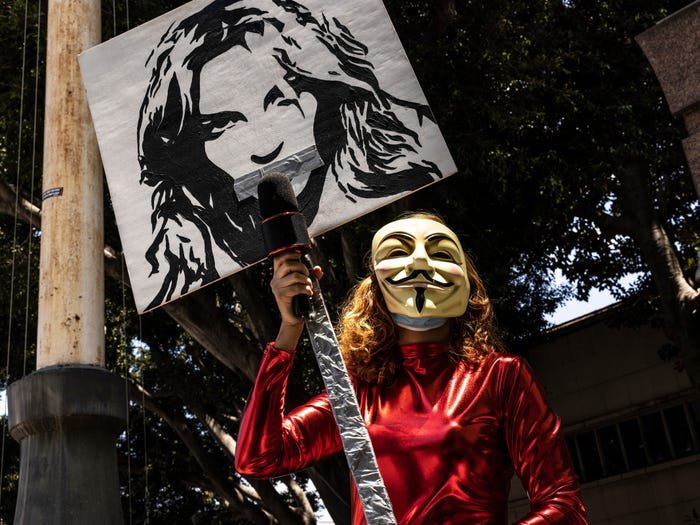
First, they ignore you; then they laugh at you, then they fight you. It’s a well-known course of events for all sorts of unions, activists, movements, and anyone who challenges power.
Those who haven’t been following Britney’s life too closely might be surprised by this parallel. Her supporters, however, are definitely not. That’s because Britney’s recent testimony and subsequent media storm is not a coincidence; it’s a conclusion. A conclusion that would most likely not have happened if it wasn’t for those who voiced their concerns for over a decade. Most prominently, fans and allies organized around the #FreeBritney movement, as well as people that were close to Britney, supportive celebrities, and others.
But let’s rewind. How did the Free Britney movement actually start, and what’s it all about. Most people, until recently, were entirely unaware that Spears is not allowed to make her own decisions or be in any meaningful way independent. The legal framework which limits Britney’s agency is known in US law as conservatorship. It’s a form of adult guardianship that gives custodians complete control over financial affairs and persons’ daily lives. Conservatorships are commonly appointed in cases of old age when the elderly are no longer able to do banking or handle day-to-day business. They can also be put in place when a person suffers a debilitating accident like a stroke or brain aneurysm or in case of developmental limitations.
Contrary to what some might think, mental issues (that many say Britney might be suffering from) do not qualify anyone for a conservatorship, and for a good reason. There are various existing solutions in place, from psychiatrists to mental institutions, that address that. To think that all those seeing psychiatrists should also be forced into conservatorship sounds absurd. Same in the public sphere — there’s been no shortage of celebrity meltdowns in the last few years, from Charlie Sheen to Kayne West, and again, nobody expects they should lose their independence. In short, conservatorships are not meant to be used in the case of functioning adults.
Spears was put under a conservatorship in 2008 at the age of 26, which made her case quite unusual right from the start. At the time, all the proceedings were shrouded in nondisclosure and confidentiality agreements, officially to protect the singer’s privacy, so very little was available to the public. What served as a spark was Spears erratic behaviour, culminating in her famously shaving her head and being submitted to rehab. Around the same time, her father Jamie moved to court for an emergency, temporary conservatorship. Everything was done in a rush, and as a result, Jamie becomes the sole conservator and with that obtains complete control of his daughter’s estate, health, and her entire life: food, activities, clothing, medicine, people allowed to visit, and so on. “It’s a very abnormal situation” — said Sarah Wentz, a legal expert in guardianships and conservatorships — “ we almost always see this [conservatorships] in cases where a person is mental handicapped in a way where they don’t know how to shower themselves or feed themselves” adding “The people that I’ve had conservatorships over could not go out, and present awards at awards shows or perform in front of a large audience.”

In those early days, one transgression is specifically worth mentioning. According to the court form — Britney had the right to an attorney of her choice and expressed the desire to hire one. This right was, however, denied (at that time, again, under a non-disclosure agreement) and instead, Britney received a judge-appointed council who, as time would tell, would represent her father’s wishes rather than her own. Britney’s attempt to hire an additional second lawyer was also turned down. As a result, there was no adversarial relation between Britney’s legal team and her fathers. As Tom Coleman, an attorney with Spectrum Institute had bluntly put it, “from that moment forward, her fate was doomed.”
First, they ignore you
Given that Jamie Spears was now also in charge of managing doctor visits (who provided the court with evidence regarding conservatorship status) and the fact Britney’s judgeappointed council a strong incentive to operate within the conservational status quo, everything seemed airtight. From the family’s perspective, they just averted a major disaster! Britney won’t act erratically, lose her fortune, be taken advantage of, get addicted, or anything of that sort. While this sounds cynical, it is plausible that initial intentions behind the court move were most likely good and meant to shield Britney and her family from what looked like a scary downward spiral. However, there’s a very fine line between being protective and controlling and intentions can get twisted pretty quickly especially when there’s so much money involved, and it’s about someone as recognizable as Spears. Jacqueline Butcher, a former friend of the Spears mother, later told New Yorker she regretted her testimony that helped secure the outcome “At the time, I thought we were helping.”
There’s also an ethical component to it; we’re all entitled in principle to our own lives, which also means our own mistakes and mishandlings. At what point would it be justified to step in and limit someone’s freedom to make those mistakes? Moral dilemmas aside, what’s important is that from a legal point of view, intentions do not justify conservatorship; health does. Jamie’s team seemed to have been aware of this weak link, and for all those years, they made sure everyone who worked with Spears had to agree to an NDA. Every interviewer, dancer, or artist that collaborated with her had to sign one of those. Once signed, NSA expressly forbids the signee from revealing anything about Britney’s conservatorship or health. Meanwhile, Spears, from what we know now from her testimony, was pretty much convinced into thinking that her conservatorship will never end if she at any point decides to discuss it publicly. To make this threat plausible, her appointed lawyer explained nobody would believe her; it would make her look crazy in the media’s eyes, reinforce the idea that she is mentally unwell and ruin any chances of conservatorship ending.
With all potential risk factors taken care of — conservatorship could, in theory, be extended indefinitely without attracting anyone’s attention. And so it was. Years went by, Britney kept releasing her multi-platinum albums, accepting awards, giving interviews, doing tours, and even appearing on X-factor as one of the judges. It all seems almost mind-boggling, given what we know now, and it exemplifies, among other things, how detached and artificial our mainstream culture is, where you can manufacture and sustain such an all encompassing illusion. To most people around the world, Britney was leading a typical celebrity life with her own pursuits, plans, and sovereign career choices, when the reality was anything but.
However, there was still one factor, one element that could not be controlled by fear, money, or non-disclosure agreements—her loyal fan base.
Then, they laugh at you
While there was no hashtag in the beginning, Free Britney is as old as the conservatorship itself. Back in 2008 and 2009, fan communities were mostly organized on MySpace and blogging websites. And it’s not hard to guess what their sentiment was. Though details were scarce and the ridiculing narrative of unstable bald Britney still fresh — fans were immediately very critical of what they saw as unproportionate and overly punitive measures. Early days consisted, therefore, mostly, of fans trying to dissect the whole structure of guardianship, pointing out conflicts of interest, financial incentives, potential beneficiaries of status quo as well as shedding light on people involved in the process, especially Britney’s manager, Lou Taylor, who has long been accused by fans as one of the masterminds.
Though most of these websites flew under the radar and had limited reach, Spear’s father attempted to curb those groups early on. Notably, one popular website BreathHeavy was forced to shut down after being threatened with possible injunction over various copyright and trademark violations. Website’s owner Jordan Miller claims Jamie Spears personally intimidated him over the phone. All of that was just a few months into the conservatorship (which was still considered temporary at that time), so stakes were somewhat high in that respect. Once the dust settled and conservatorship quietly made permanent, Spears management became much less reactive, opting to largely ignore Free Britney fans and focus on crafting their own narrative of success instead.
As the years passed and social media entered the scene, things got more organized, bigger, but also weirder. The rise of Twitter, Facebook, and Instagram allowed for less centralized open-source groups and communities to flourish. They rallied around the #FreeBritney hashtag, which was then spread around to raise awareness and gather support outside those groups. Meanwhile, Britney also had her own social media presence grow. According to Crowdsurf (the company responsible for managing her accounts), Spears herself always provided materials, and Crowdsurf would only be in charge of curating and posting that content, not creating it. That didn’t stop many of her fans from theorizing how much real control Britney Spears actually has over social media and what is going on behind the curtains.
As Free Britney grew larger and attracted more and more fans, many of these theories became increasingly conspiratorial. Anyone who follows activism knows these emergent processes, but Free Britney is interesting in many ways. For example, it’s not tied to any overarching theme, and it never bothered itself with being one. Neither republican nor liberal, neither citizen activism nor economic activism but simply fans that love Britney Spears and want to help her. In many ways, this helped Free Britney grow into a movement and at the same time avoid many perils that plague social activism from being de-escalated or fragmentized to getting incorporated and overshadowed by a bigger cause.
Notwithstanding those successes, a growingly conspiratorial approach could be understood as a sign of radicalization among many of Britney’s fans. Discussion groups were now focusing not just on guardianship and its structure but also looking for messages hidden in Britney’s dress, decoding her emoji sequences, claiming she had spelt “call 911” in her eyelashes and so on. When Britney’s gym burned down, some fans immediately interpreted it as a distress signal; badly done makeup became proof that management is making Britney look bad on purpose to justify conservatorship. Fans would grow more radical, seeing everything as either proof that Britney is in imminent danger or as part of management’s plot. This invited ridicule but, on the other hand, generated some momentum and buzz. Even though, for many #FreeBritney movement became synonymous with obsessed fans and tabloid curiosities, it also meant the same portion of the general public was now actually aware of the hashtag.
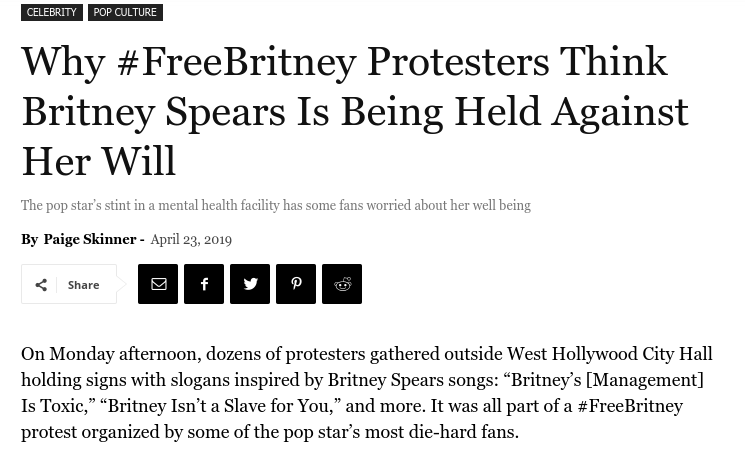
Around the same time, Free Britney started being referenced in the mainstream. Even though almost every mention was full of disclaimers (as in ‘we do not endorse or suggest any of this is true’), it did help bring attention. It was still mostly fans, though, that were vocally pushing forward. For professionals like journalists, media personalities, legal experts, and so on, discussing Britney Spears’ guardianship was still too risky. There was a risk of controversy, ridicule, potential liabilities regarding non-disclosure agreements, defamation lawsuits from both Jamie Spears and Lou Taylor, and so on. The grain was just too deep to cut against it. To put into perspective how things quickly changed: back in May 2019, Variety still called Free Britney a “meme” purported by conspiracy-theory-minded fans. And that’s how things were for a while.
So first they ignore you, then they laugh at you
Then, they fight you
In retrospect, some of those fan-made claims turned out true. For example, when Britney assured everyone via Instagram that she’s fine and happy, many fans questioned the authenticity of that statement. Though at the time this seemed far-fetched and very conspiratorial, Britney later admitted in testimony that her post indeed wasn’t genuine and even apologized to her fans for that. But in retrospect, everything seems more obvious. Back in 2020 and early 2021s, claiming Britney does not feel happy, even though she says she does, and then having to create an additional theory to explain that dissonance did not seem convincing to most.
But as the movement grew, so did the number of #FreeBritney fan videos, posts, and accounts. Not all were sensational; many would have a ‘what we know’ approach and focus on pointing out various confirmed and established issues around Britney’s conservatorship. In 2016 Britney met Hilary Clinton and posted a photo from the meeting along with the #imwithher tag which was later deleted. At the time, the media wondered. Does this mean Spears decided to withdraw her endorsement? Or maybe she’s not ready to support Hilary just yet? Out of dozens of articles, not one seemed to be aware of the fact that Britney Spears not only cannot endorse anyone, but she’s not even allowed to vote. Free Britney fans speculated that the tag was removed strictly for that reason, not because Britney was ready to endorse a different candidate (which we know she could not) but to protect conservatorship and keep the public uninformed.
With the 2020 election at hand, Free Britney fans leveraged their momentum and increased exposure to bring this issue back to focus along with many others. The fact that Britney is not allowed to vote (something even people suffering from severe mental disorders are entitled to) resonated quite strongly. Podcast “Britney Gram,” originally intended as a gossip show, became another huge megaphone for Free Britney proponents. Another development that caught media attention were physical protests. During hearings, dedicated fans assembled outside LA Court carrying #FreeBritney posters and banners, and with each hearing, the number of fans grew larger and larger. Photos from those events proved invaluable. Apart from being a good visual backdrop for articles on the matter, they helped shift perception from abstract to more personal. There’s something inspiring about seeing fans united by love for their favourite artist, taking action, and speaking against injustice. Soon photos of protesting fans became the norm — included in Getty stock collection and frequently used in all sorts of articles covering Free Britney.
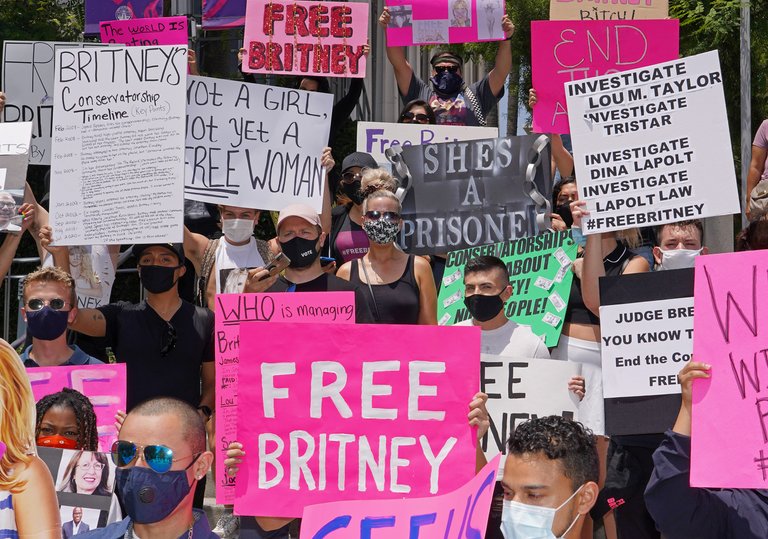
Subsequently, the conservatorship hearings, which until now were, for the most part, lowkey and invisible to the public, quickly became newsworthy. Every time the court would gather whether to grant another extension or for any other reason, it also meant Free Britney rallies and with that media coverage and articles. Rallies were also held in West Hollywood and other places around the US. For Jamie Spears, this development was highly undesirable and a growing source of irritation. In 2019 both he and Lou Taylor filed defamation lawsuits against Free Britney bloggers. “It is time for the conspiracy theories about Britney Spears’ well-being and the mob #FreeBritney movement to stop,” his statement read. But the movement had grown a lot since 2009, and suppressing a couple of fans did not seem to matter much. Also, the world itself became o lot more decentralized with Youtubers, bloggers, and commentators. Fans repurposed lawsuits to increase Free Britney visibility even more, and those targeted by lawsuits became new heroes for the cause, thus emboldening others.
Another significant 2019 development that hindered plans to quash the movement was the growing support from high-profile individuals. Paris Hilton included the hashtag in her tweet, Miley Cyrus shouted, “Free Britney” at her concert, and Rose McGowan made a video on Instagram. In 2019 these acts of solidarity required courage. Miley Cyrus was later asked to explain if she meant it in earnest and what she thought of the Free Britney movement — questions that show it was still quite controversial to voice support for what many agreed was a conspiracy. But the trail had been blazed. By 2020 the number of high-profile individuals that supported the movement wasn’t just higher than in 2019; it was higher by order of magnitude.
Going after regular people when celebrities support the cause itself is pretty much counterproductive; that’s true for any movement. For Free Britney, this was a huge milestone, but Jamie Spears still referred to it as an unfounded conspiracy. In an interview given in August 2020, he fought back accusations, mentioned receiving death threats and reiterated the entire movement is a joke.
But the movement kept expanding and with a growing number of celebrities behind it also attaining legitimacy. Fear of being ridiculed or sued subsided, and it wasn’t too long before insiders started speaking out. Actually, the first leak came already in April 2019. Britney’s Gram (a podcast mentioned earlier) received a voicemail from a person claiming to be a former member of the Spears paralegal team. He or she alleged that Britney’s been held in a mental facility against her will for much longer than it was officially presented and that it wasn’t because of mental breakdown but for “misbehaving.” Source also alleged that Britney had been heavily medicated and that one of the attorneys, Andrew Wallet quit not due to unrelated issues but due to a fear that he would be disbarred. Podcast hosts attested their source is very reliable, and it gave Free Britney a substantial boost, but without any further evidence, it didn’t lead to any inquiries or changes.
At least not on a formal level. In Nov 2020, Lou Taylor decided to resign without notice amid growing controversy. The tide was turning, and it became safe, desirable even, for the media to chase this story. As a result, more leaks followed, along with an extensive documentary, “Framing Britney Spears,” directed by Samantha Stark. The documentary follows Britney’s entire life with a focus on her conservatorship struggles. If the tide change was already felt before, then “Framing Britney Spears” made it official. Long Fight to ‘Free Britney’ read The New York Times article after the movie premiered with other outlets following suit. Three months later, another documentary debuted, “The Battle for Britney” by Mobeen Ahzar and then “Britney Spears: Fighting for Freedom” by Nick Randall. Free Britney is featured prominently in all of those movies; there’s this sense of uphill battle that the movement encapsulates, and it’s hard to imagine how those documentaries would look like (or even if it could ever exist at all) without this key element.
Each of those documentaries brought some new information, but one piece was especially newsworthy. According to documents obtained by “The Battle for Britney,” the mental illness that Britney is suffering from and which justifies conservatorship relates to dementia treatment. Now, this would mean Spears had to be diagnosed with dementia at the age of 26, which seems very unlikely. Given her ability to do tours and release albums for the next 13 years and knowing how dementia progresses, this sounds pretty much impossible. It would also explain why she wasn’t allowed to have legal representation of her choice (as a demented patient, her ability to select a representative could be easily waived). As late as 2020, her court-appointed lawyer still argued that Britney’s mental capacity is similar to that of a comatose patient. All of this caused a lot of concern and raised new accusations against Jamie Spears. Suggesting he used paid-off doctors became part of the discussion and not considered conspiratorial anymore. For #FreeBritney proponents, this finally felt like validation.
Then you win?
On June 23, 2021, Britney Spears decided to finally speak out. Her testimony was considered explosive, emotional, and harrowing and left no doubt that Britney has been a victim of conservatorship abuse. Among many shocking details, Britney revealed she has an IUD (intra-uterine device) installed in her body that she’s not allowed to take out and that she was forced to perform when unwell and with fever. She described countless disturbing forms of punishment and coercion, being put on lithium and into rehab for asking to end her Las Vegas residency, being threatened with not being able to see her children, and even being punished for refusing to do a dance move during rehearsal (we can safely assume it was a move she wasn’t comfortable with). It paints a grim picture suggesting Britney was medicated, exploited, and forced to work in constant fear of reprisal in case of objection. And while she made millions, none of that money belonged to her. As it turns out, she couldn’t even repaint her kitchen cabinets — her father deemed it was too expensive (she also wasn’t allowed to have cabinets in a colour of her choice and so on). She ended her testimony with depressing, “I wish I could stay on the phone with you [the Judge] forever.”
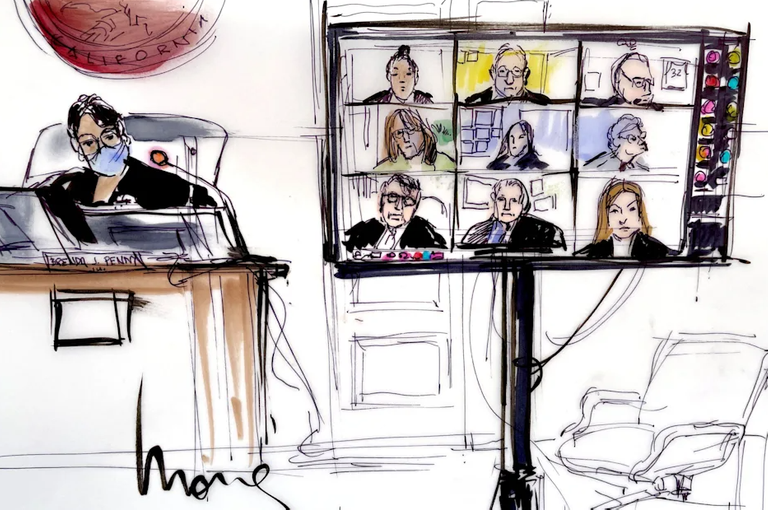
Reaction to Britney’s testimony was massive; conservatorship mess is worse than you thought headlines read, The New Yorker published its own lengthy report titled “Britney Spears’s Conservatorship Nightmare”. Without fear of NDAs, ever more people started speaking up, corroborating Britney’s testimony, confirming seeing instances of abuse, fatshaming, using racial slurs, applying NDA pressure on people Spears worked with, and so on. Rose McGowan called it a cultural reset, adding, “What has been done to her is horrific (…) while we’ve all been entertained by Britney Spears, she’s been being tortured”.
In fallout, most members of the conservatorship team have resigned shortly after. Britney’s manager also decided to step down. As for Jamie Spears, possibly in an attempt to shield himself from any fault he decided to open an inquiry into “serious allegations regarding forced labor, forced medical treatment and therapy, improper medical care, and limitations on personal rights.” while at the same time blaming Jodi Montgomery (Britney’s running co-conservator) for all the abuses. There’s also a broader discussion around conservatorship reform that spawned as a result.
As I write this, Britney is still under conservatorship and has no access to her wealth or but it seems unlikely this situation will continue for much longer. With court-appointed lawyer soon gone, there’s a lot of successful, high profile attorneys interested in stepping in, ready to represent Britney in her struggle. A lengthy legal battle might ensue over money and legacy and as more and more questions come out regarding potential misconducts, we might even see some people face responsibility.
Would Britney decide to speak out if it weren’t for the momentum created by the Free Britney movement, all the support that it generated from fans, celebrities, directors, and all the discussions that followed? Everyone including her father, manager, doctors, and even her own lawyer were discouraging her, saying she would be ridiculed, that this isn’t how things work. She’s also been flat out lied to: Britney was not aware that she could petition the court (serious misconduct from her appointed lawyer if true) she was even told she can be sued (!) if she fails to do a 2018 Piece of Me tour. “It was very threatening and scary,” She told the court, “And with the conservatorship, I couldn’t even get my own attorney. So out of fear, I went ahead, and I did the tour”.
Given this degree of manipulation, the answer is: no, she would most likely not speak out. It had to take a lot of courage as it is for Britney to make her testimony. Without Free Britney, there would be no hashtag, no protests, no way for celebrities to express support or address Britney Spears not as a brand, but directly as a person, in short, no way for Britney to see or know any other point of view.
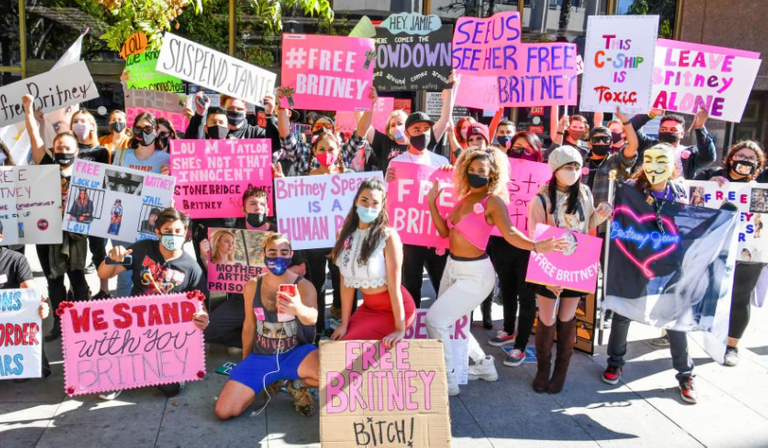
It’s an inspiring lesson for all of us activists out there. Free Britney managed to achieve so much in a totally grass-root fashion. There was no massive funding to kickstart the movement, no big-headed politics, and strategy, just pure will to help Britney Spears and a group of dedicated fans united by love for their favourite artists. Fans managed to grow organically, use social media, take it to the streets, shift public perception, gather celebrity support, expose wrongdoings and eventually help give Spears courage to stand up. Free Britney obviously represents its own microcosm, whereas cases involving freedom of the press, humanitarian issues, and so on are often messy with various domestic and international actors, pushing their separate agendas, but the core principle remains the same. Standing up for what you believe in, with passion, love, and pure intentions will shine through, and while nothing is guaranteed in this world, it will make chances for success much better.
It’s a win for Britney Spears, a win against misogyny, a win against greed and control, and a win against forces that are bigger than any of us. And it couldn’t come from a more upbeat and cheery group of people.
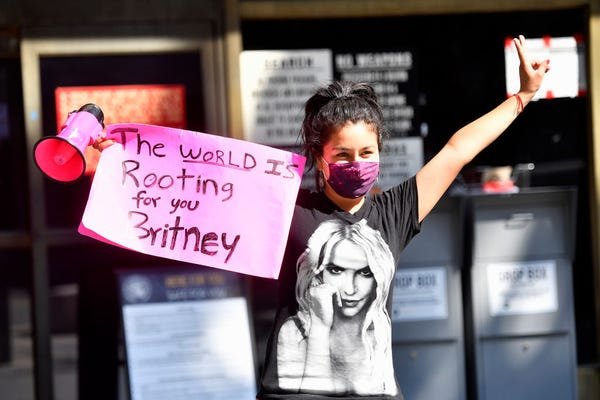
Wow, this is one extensive post, thank you, I wasn't aware that her situation was so bad. And Jamie could compete with Amy Winehouse's father for "the worst father ever" prize.
I think I might have dived a bit too deep, next time I'll try to keep it within 1000-1500 word range ;p
Yes, Jamie went bonkers from all that power, when challenged he (reportedly) would shout "I am Britney Spears!!" 🤪 He kept Britney so sheltered that she had to be taught how to use Google (and that was even before the conservatorship, it got even worse later on). It's a sad but fascinating story.